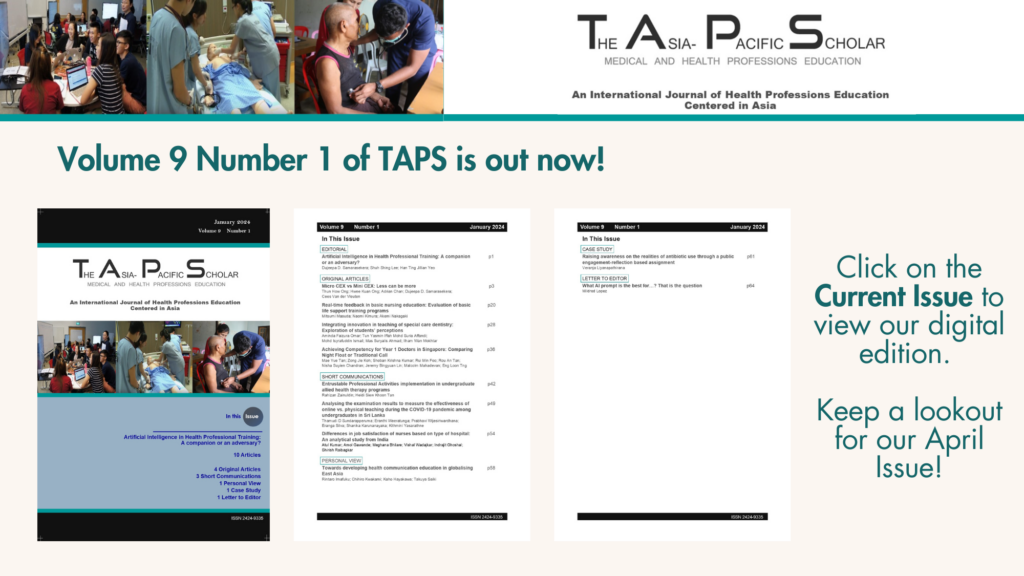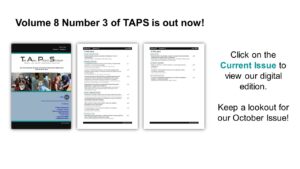LOTTE Transdisciplinary medical education promotes interprofessional collaboration and independent learning in medical undergraduates
Submitted: 2 June 2021
Accepted: 21 June 2021
Published online: 4 January, TAPS 2022, 7(1), 115-116
https://doi.org/10.29060/TAPS.2022-7-1/LE2546
Clement Luck Khng Chia1, Shaun Wen Yang Chan1, Priscilla Ng2 & Chee Chew Yip3
1Department of General Surgery, Khoo Teck Puat Hospital, Singapore; 2Department of Geriatrics, Khoo Teck Puat Hospital, Singapore; 3Department of Ophthalmology, Khoo Teck Puat Hospital, Singapore
Dear Editor,
Khoo Teck Puat Hospital held its first LOTTE (Learning Oriented Teaching in Transdisciplinary Education) elective program for Yong Loo Lin School of Medicine students in April 2021. The four-week program focuses on undergraduate medical education in an inter-professional collaborative setting through observation and presentation of complex clinical cases. Its teaching-learning activities are underpinned by the Learning Oriented Teaching (LOT) theory (ten Cate et al., 2004) to improve learning at the cognitive, affective and metacognitive levels with shared guidance between students and faculty.
At the cognitive level, students were encouraged to take ownership of learning, do literature review and present cases. Faculty critiqued and helped students to refine learning objectives and identify pertinent clinical aspects for elaboration and learning.
At the affective level, students were motivated to present cases on Zoom videoconferencing to classmates as they learned through active doing and attained peer recognition of their good effort. The teacher highlighted the importance of peer learning through discussing authentic, complex cases that required transdisciplinary holistic patient care.
At an interactive self and peer learning level, students used tools such as the Kahoot! game-based app for peer teaching to optimise learning and increase participation.
With a greying population, there is a need for transdisciplinary education to improve patient outcomes in the geriatric population (Chia et al., 2016). LOTTE provided an introduction to transdisciplinary education and highlighted importance of integrating competencies from various disciplines in preparation for future practice.
The first run of LOTTE consisted of seven transdisciplinary themes. An example of a transdisciplinary theme would be “Palliative Surgery” offered by both a palliative physician and an oncology surgeon. LOTTE differed from traditional “single discipline” electives as it emphasised inter-professional collaboration and collective learning involving the surgeon, physician and students. Students divided their time equally in both subspecialties, attending ward rounds, clinics, operating theatres and home visits. They encapsulated their learnings by presenting real-life complex cases via Zoom in the last week to their peers and faculty. Learning opportunities in two subspecialties were maximised with the student following through the patient journey from ‘Start to Finish’ (Chia et al., 2016).
Medical graduates face an increasingly complex healthcare landscape where management of co-morbidities may be beyond one’s expertise. LOTTE may be helpful to promote transdisciplinary collaboration for holistic management of complex geriatric patients and nurture the development of independent learning in medical undergraduates.
Notes on Contributors
Dr Clement Chia conceptualised and designed LOTTE framework, was a faculty in LOTTE and wrote the manuscript and approved the final version.
Dr Shaun Chan conceptualised and designed LOTTE framework, helped coordinate students, was a faculty in LOTTE and revised and approved the manuscript.
Dr Priscilla Ng conceptualised and designed LOTTE framework, was a faculty in LOTTE, revised and approved the manuscript.
A/Prof Yip Chee Chew conceptualised and designed LOTTE, revised and approved the manuscript.
Acknowledgement
We would like to thank all the transdisciplinary educators who made this inaugural run of LOTTE possible. They include A/Prof Tan Kok Yang, A/Prof Toh Hong Chuen, A/Prof Tavintharan Subramaniam, Dr Desmond Ooi, Dr Tan Mingyuan, Dr Tan Bo Chuan, Dr Ruth Chua, Dr Benjamin Lam, Dr Visnja Baksa Reynolds and Dr Gabriel Cher.
Funding
There is no funding for this study.
Declaration of Interest
Authors declare no conflict of interest.
References
ten Cate, O., Snell, L., Mann, K., & Vermunt, J. (2004). Orienting teaching toward the learning process. Academic Medicine, 79(3), 219-228. https://doi.org/10.1097/00001888-200403000-00005
Chia, C. L. K., Mantoo, S. K., & Tan, K. Y. (2016). ‘Start to finish trans-institutional transdisciplinary care’: A novel approach improves colorectal surgical results in frail elderly patients. Colorectal Disease, 18(1), O43–O50. https://doi.org/10.1111/codi.13166
*Clement Chia
Khoo Teck Puat Hospital,
90 Yishun Central,
Singapore 768828
Department of General Surgery
Tel: +6566022207
Email: chia.clement.lk@ktph.com.sg
Announcements
- Fourth Thematic Issue: Call for Submissions
The Asia Pacific Scholar is now calling for submissions for its Fourth Thematic Publication on “Developing a Holistic Healthcare Practitioner for a Sustainable Future”!
The Guest Editors for this Thematic Issue are A/Prof Marcus Henning and Adj A/Prof Mabel Yap. For more information on paper submissions, check out here! - Best Reviewer Awards 2023
TAPS would like to express gratitude and thanks to an extraordinary group of reviewers who are awarded the Best Reviewer Awards for 2023.
Refer here for the list of recipients. - Most Accessed Article 2023
The Most Accessed Article of 2023 goes to Small, sustainable, steps to success as a scholar in Health Professions Education – Micro (macro and meta) matters.
Congratulations, A/Prof Goh Poh-Sun & Dr Elisabeth Schlegel! - Best Article Award 2023
The Best Article Award of 2023 goes to Increasing the value of Community-Based Education through Interprofessional Education.
Congratulations, Dr Tri Nur Kristina and co-authors! - Volume 9 Number 1 of TAPS is out now! Click on the Current Issue to view our digital edition.

- Best Reviewer Awards 2022
TAPS would like to express gratitude and thanks to an extraordinary group of reviewers who are awarded the Best Reviewer Awards for 2022.
Refer here for the list of recipients. - Most Accessed Article 2022
The Most Accessed Article of 2022 goes to An urgent need to teach complexity science to health science students.
Congratulations, Dr Bhuvan KC and Dr Ravi Shankar. - Best Article Award 2022
The Best Article Award of 2022 goes to From clinician to educator: A scoping review of professional identity and the influence of impostor phenomenon.
Congratulations, Ms Freeman and co-authors. - Volume 8 Number 3 of TAPS is out now! Click on the Current Issue to view our digital edition.

- Best Reviewer Awards 2021
TAPS would like to express gratitude and thanks to an extraordinary group of reviewers who are awarded the Best Reviewer Awards for 2021.
Refer here for the list of recipients. - Most Accessed Article 2021
The Most Accessed Article of 2021 goes to Professional identity formation-oriented mentoring technique as a method to improve self-regulated learning: A mixed-method study.
Congratulations, Assoc/Prof Matsuyama and co-authors. - Best Reviewer Awards 2020
TAPS would like to express gratitude and thanks to an extraordinary group of reviewers who are awarded the Best Reviewer Awards for 2020.
Refer here for the list of recipients. - Most Accessed Article 2020
The Most Accessed Article of 2020 goes to Inter-related issues that impact motivation in biomedical sciences graduate education. Congratulations, Dr Chen Zhi Xiong and co-authors.









